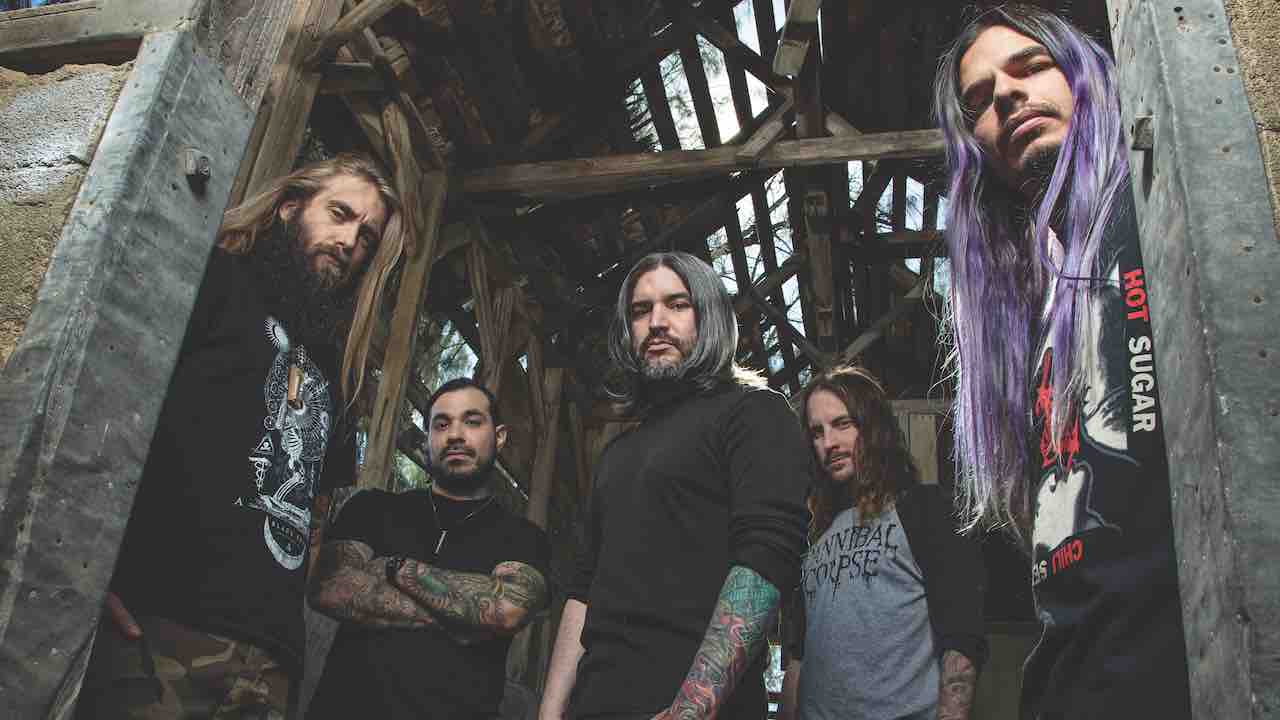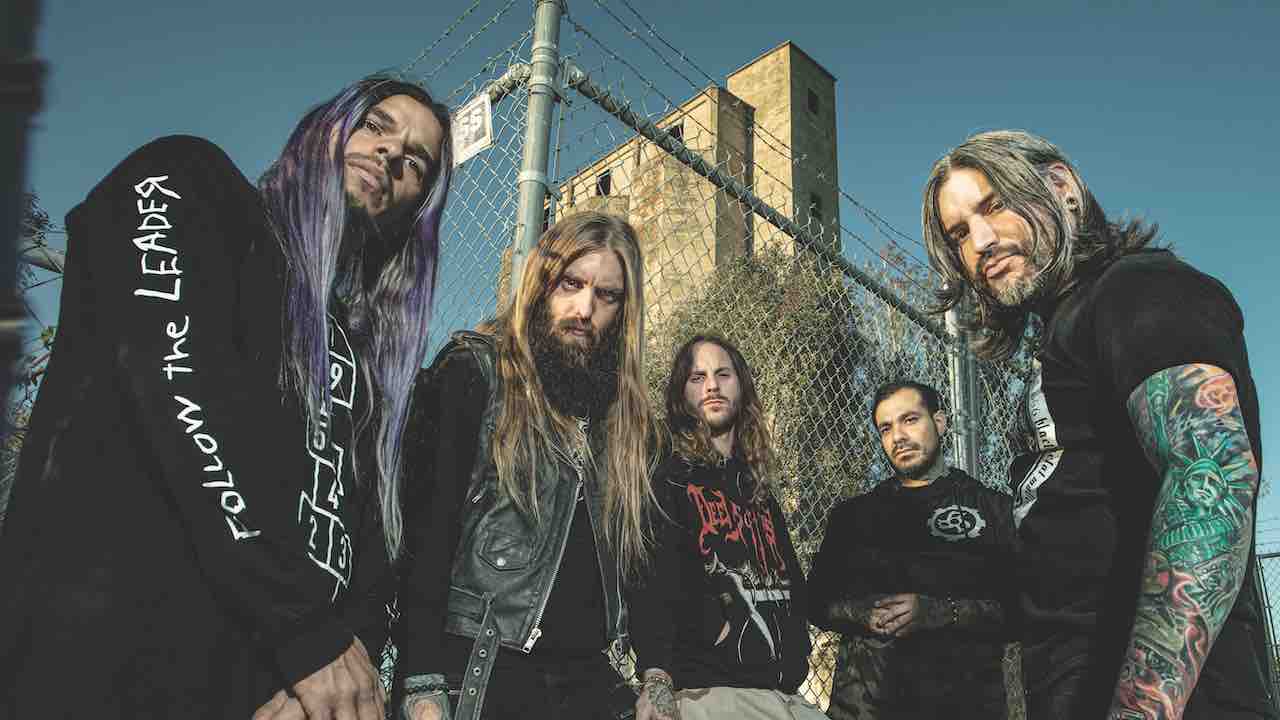Not long after Suicide Silence finished celebrating the 10th anniversary tour for their 2007 debut album, The Cleansing, guitarist Mark Heylmun received some bad news. His dad had been diagnosed with cancer. For days, Mark couldn’t concentrate, wasn’t sleeping well and didn’t want to pick up his instrument. Despite a spot on Attila’s Rage Fest tour scheduled in support of the band’s fifth album, 2017’s ill-fated Suicide Silence, Mark decamped to his parents’ home for what turned out to be the beginning of a year-long hiatus.
That left guitarist and band co-founder Chris Garza the lone creative force; Chris and Mark had written as a team since the latter joined the band in 2005. After finishing the main chug’n’charge arrangement of Disaster Valley, Chris played back the demo and, while he liked what he heard, he could tell something was missing. For the first time, he seriously wondered if Suicide Silence’s days were numbered.
- Watch Suicide Silence’s bludgeoning cover of Korn’s Blind
- Watch this metalhead cover Suicide Silence on Romania's Got Talent
- 10 essential Deathcore albums
- From Crossover To Metalcore: The Genesis Of A Genre
“One day things were great and the next it felt like the bottom had fallen out,” Chris says. “It was like we were on this rollercoaster, constantly going up and down. I think the only reason we stayed together is because we love what we do so much and we believed everything would eventually work out.”
Suicide Silence’s self-belief carried the band over numerous hurdles – barely. Two other members temporarily left the group for personal reasons, infighting became a daily event and the band’s handlers lost faith in them. Instead of allowing such obstacles to destroy them, Suicide Silence became more focused and determined. Their growing frustration and fury resulted in the plundering, pummelling sound of their new album, Become The Hunter, a virtual 180˚ rotation from the nu metal tones and clean singing on the Ross Robinson-produced Suicide Silence.
Vocalist Eddie Hermida has abandoned melodic vocals in favour of larynx-shredding screams and demonic growls that complement the musicians’ combination of blastbeats, double-bass rolls and ripping seven-string guitar riffs and visceral breakdowns. At the same time, Suicide Silence have added experimental flourishes, including ominous arpeggios (Skin Tight) and droning Indian instrumentation (Serene Obscene) that propel them forward while they revisit their deathcore roots.
“We took a lot of heat for the last album and the backlash was much more severe than we thought it would be,” Eddie explains. “That definitely affected us personally. You can’t just shrug this shit off and go, ‘OK, this is just the breeze in the sky. Whatever. No, it’s not ‘whatever’. This is our livelihood and our art. It’s everything we’ve poured our soul and heart into. So, yeah, some of that negativity affected us but it affected us in a way that gave us trajectory and fuelled the new record.”
As difficult as it was to face the flak that came with Suicide Silence, Chris insists the band’s abrupt sonic shift and palpable decline (some of the venues on the supporting tour were half-empty) was a calculated move. And when the album peaked on the Billboard album chart at an unimpressive #163 – their worst showing to date – the guitarist was neither shocked nor concerned. For Chris, self-sabotage was necessary for Suicide Silence to reinvigorate themselves for Become The Hunter. He says that they wanted to learn new tricks and move forward next time in a deathcore style, while also harking back to the music they loved as teenagers in order to get excited about writing music again.
“It became very apparent, after we did the first record with Eddie [2014’s You Can’t Stop Me], that the foundation we built with Mitch [Lucker, original vocalist who died in a motorcycle accident in 2012] was no longer stable enough for us to remain standing if we kept going that way,” Chris explains. “We knew we needed to start over and we were willing to do whatever it took to accomplish that no matter the cost. We realised we needed to change right away if we wanted to be around later.”
Despite the negative reaction by fans to Suicide Silence, both Chris and Eddie remain proud of the album, which took them back to a more innocent time in their mid-teens when they were swept away by the wave of Ross Robinson-produced nu metal albums, including Limp Bizkit’s Three Dollar Bill Yall$ and Korn’s self-titled debut.
“I still love that album,” Eddie says. “I turn it on today and it still gives me that rush of emotions that I was going through back when I dreamed of being in a band. But we knew that it was going to make waves, which was good. Waves destroy things in their path, but they also clear space for other things to develop.”
While Suicide Silence predicted blowback from Suicide Silence, they could never have anticipated the problems that would surface after its release. Their longtime manager Jerry Clubb quit because he hated the direction in which the band were going, being without Mark Heylmun was rough and, since ticket and album sales were down, they were making less money. Instead of drinking to celebrate their success, as they had in the past, some of the members were drowning their sorrows. And when drummer Alex Lopez drank too much, he became belligerent.
“That last summer of touring was pure fucking hell,” Chris says. “There are two kinds of drinkers. You have the naturally happy guys, who get funny when they drink, and then you have the people that can’t stop after one or two drinks. Alex was like that. He would get pissed and then he’d be really angry. There weren’t any fistfights, but him and Eddie got into it a couple times and almost threw punches.”

Exasperated, bassist Dan Kenny left for about a week. Suicide Silence finished a few songs while Mark was gone, but the guitarist’s return in late 2018 injected fresh life into the band and enabled Chris to up his game. Mark, who’d been able to spend some quality time with his dad before he passed, was hungry to create and quickly made up for lost time.
Almost immediately after Mark returned, Alex left the band to clean himself up, yet even with their drummer missing, Suicide Silence felt more creative and invigorated than they had in years. “With Mark back, it felt like all the pieces were in place again,” Chris says. I could tell he was clear and ready to go and he came up with the coolest riffs ever.”
Alex hadn’t returned to Suicide Silence by the time the songs for Become The Hunter were almost done, so the band hired ex-Whitechapel live drummer Ernie Iniguez, who learned the parts and tracked all the drums. With forward momentum building again, the band made up with their manager, Jerry Clubb, who suggested Suicide Silence write a concept album about serial killers. As a longtime fan of true crime, Eddie was excited to start working on lyrics and Jerry contacted filmmaker Scott Hansen to direct a trio of gruesome narrative videos (see panel, right). In no time, Eddie had written down his thoughts about the murderers he found most interesting, including Ed Gein, the Boston Strangler, Ted Bundy, BTK and Christopher J. Scarver, the convict who murdered Jeffrey Dahmer.
“I was able to combine things about these killers with other stuff I was feeling,” Eddie says. “The thing about serial killers that’s fascinating is that they look like normal people, and in some ways they are. I think all of us have this little instinct, this urge to drain the life from someone. The difference is we know how to suppress it, but serial killers don’t.”
Eddie discovered writing about serial killers offered a fringe benefit. He didn’t have to write as intensely about himself, as he did on Suicide Silence, which addressed his history with past addictions, alcoholism, depression, family trauma and suicidal thoughts.
Despite the negative reaction by fans to Suicide Silence, both Chris and Eddie remain proud of the album, which took them back to a more innocent time in their mid-teens when they were swept away by the wave of Ross Robinson-produced nu metal albums, including Limp Bizkit’s Three Dollar Bill Yall$ and Korn’s self-titled debut.
“I still love that album,” Eddie says. “I turn it on today and it still gives me that rush of emotions that I was going through back when I dreamed of being in a band. But we knew that it was going to make waves, which was good. Waves destroy things in their path, but they also clear space for other things to develop.”
While Suicide Silence predicted blowback from Suicide Silence, they could never have anticipated the problems that would surface after its release. Their longtime manager Jerry Clubb quit because he hated the direction in which the band were going, being without Mark Heylmun was rough and, since ticket and album sales were down, they were making less money. Instead of drinking to celebrate their success, as they had in the past, some of the members were drowning their sorrows. And when drummer Alex Lopez drank too much, he became belligerent.
“That last summer of touring was pure fucking hell,” Chris says. “There are two kinds of drinkers. You have the naturally happy guys, who get funny when they drink, and then you have the people that can’t stop after one or two drinks. Alex was like that. He would get pissed and then he’d be really angry. There weren’t any fistfights, but him and Eddie got into it a couple times and almost threw punches.”
“It was a relief not to be writing about things that were so debilitating to me,” Eddie says. “It was much less traumatic to write about serial killers. But it’s still really fucked up and kind of scary. I’ve always loved listening to music that almost makes me die a little inside.”
A few days before the release of Become The Hunter, and with Alex now back in the band, Chris is reflecting on the hardships of the past few years. When asked if, knowing what he knows now, he would still have made a nu metal album with Ross Robinson, the guitarist stops long enough to fit a ball gag through his pregnant pause. Finally, he answers in the affirmative.
“Here’s the thing,” he says. “Most bands won’t try anything drastically different because they’re afraid to lose momentum and confuse people. We’re not afraid of that. We went into this and saw a huge peak in the distance, but there was a big-ass valley in front of us. We were willing to go through that valley because there was a greater goal, which was to reach the far-away peak. And running through that valley was hard, but it brought us all closer together even when it was threatening to tear us apart. It was almost like we put ourselves through this personal test of walking through fire and knowing that we were going to get burned in order to get out stronger on the other side.”
Published in Metal Hammer #333
